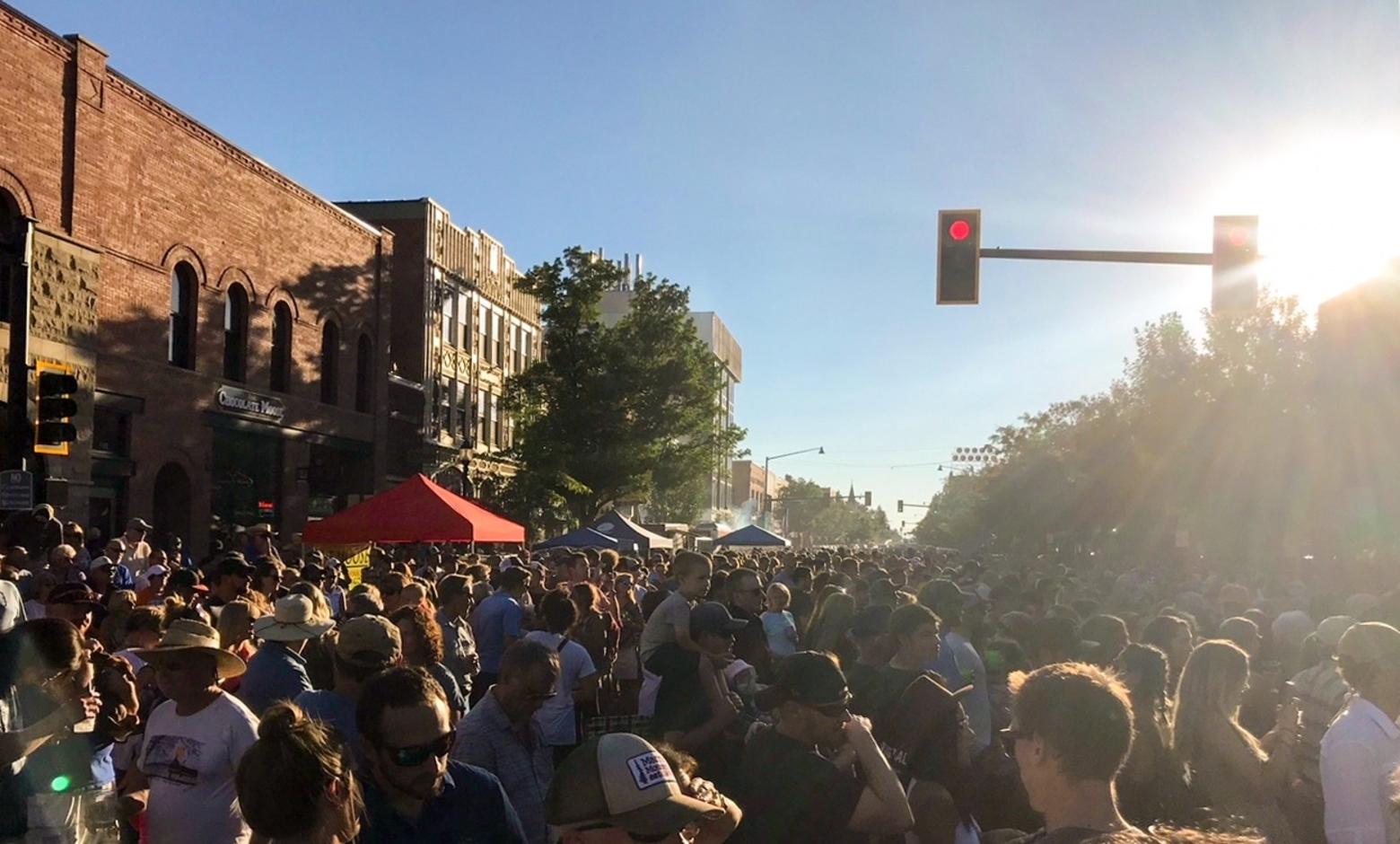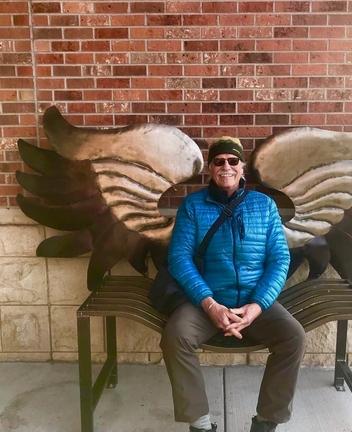Back to StoriesWhen Nature And The Solace Of Open Spaces Aren't Enough
July 23, 2018
When Nature And The Solace Of Open Spaces Aren't EnoughIn Bozeman, some philanthropists are helping others improve their mental health by buying them sessions of therapy
I find joy mixing it up with members of my community. They converge like tributaries to create the river that is my mountain town, Bozeman, Montana.
During July, it means visiting our local farmers' market held at Bogert Park, grooving to the tunes at Music on Main, and watching the Bozeman Bucks play the Yakima Beetles out at Heroes Field during the recent American Legion baseball tournament.
In every direction there is a touchpoint to our town. It could be King Arthur’s trailer park or Sourdough Ridge, or through our involvement with civic associations, church membership or the Dharma Center. In the social realm, it might meaning buying drinks at Plonk, the Scoop or the bar in Ted’s Montana Grill.
Soon, too, it will be Sweet Pea time, the festival held every year in early August when we demonstrate to visitors why we love this place so damned much. And then, of course, there are the trails, streams and peaks.
These are intersecting personal orbits of preference and access we all identity with Bozeman and every community up and down the Rockies has them.
There is a blush of communion during these times when we come together, until too much alcohol is consumed and fights break out. But rarely does individual behavior sabotage community spirit. Yet behind the facade of persona (the psychological term for the kind of self we present to community), merriment, and staged events is another story of individuals seeking guidance on how to live in a robust mountain town. This challenge requires its own gear, and one of the tools is counseling when the balm of nature and solace of open spaces alone just aren't enough.
Mental health and illness are still defined by a medical pathological model. Each person seeking counseling from a licensed clinical counselor, psychotherapist, psychologist, or psychiatrist must find a way to pay for treatment.
As with any other medical provider, people turn to their insurance companies to secure coverage for the $120 to $160 per hourly session. It can be pricy for individuals to pay and hereis where the medical model plot thickens.
It is not only the case that as a provider I must have a valid license which theoretically provides for third party payments, but in addition each insurance company creates another level of provider restriction by creating a “preferred provider” category.
I am required to submit insurance claims to my client’s insurance provider, but that means said client will carry a precise medical diagnosis on their insurance companies records. It also means they are now labeled with a “disorder.”
"Insurance companies require that I label people with a disorder. As a therapist, I have trouble pinning that on a client. Why? Because every 'healthy' human being, if they are conscious, will cope with various kinds of normal struggle."
As a therapist, I have trouble pinning that on a client. Why? Because every “healthy” human being, if they are conscious, will cope with various kinds of normal struggle, not only because modern life guarantees it, but the sometimes agonous search for meaning is a natural part of the human condition. In other words if you are thinking, and wondering how you fit into the world, and attempting to be clear headed, which is a good thing to be doing, it’s not “bad” to want to talk to someone about it.
Other countries in the world, with far high happiness quotients than ours, do not stigmatize mental health care.
To imagine that an Adjustment Disorder with mixed emotions and behavior is somehow similar to strep throat in its implications is also to court fantasy thinking. But to imagine parity between mental and physical health as a perspective about our wholeness is certainly healthy.
Yet there is still going to be the idea that there’s “something wrong with me”, no matter how you cut the pathological pie.
Currently my professional fee for a full hour consultation is $120. And although I am not a preferred provider to any insurance company, many of my clients receive reimbursement for my services from their insurance carrier. Notable in our town are those who are covered by Montana State University’s Blue Cross/Blue Shield program.
I have often wondered, however, maybe since I personally have not been able to afford such coverage as a self-employed therapist, how using insurance to cover therapy versus other medical offerings works.
If neurosis, psychosis, personality disorders, and mood disorders are health issues then why not cover their treatment with medical insurance? Right?
But is the way in which we conceptualize such care really the problem? What if it’s about something else? What is that, you may ask. Stay with me, here.
There are many among us who desperately need but cannot afford either type of insurance that covers counseling or they personally don’t have sufficient means to pay the provider directly.
A recent story about mental health in the Bozeman Daily Chronicle quoted an estimate that “42,600 Montanans who have a serious mental illness.”
The population of Montana in 2017 was 1.05 million. The number above is significant. The key term here is “serious” mental illness. As with any disease, there is a spectrum of severity.
Although I work with local psychiatrists and physicians to both prescribe and manage psychopharmaceuticals, the most common form of care I provide our community is the treatment of highly-functioning people who are plagued by levels of anxiety (eating disorders are anxiety disorders), suicidal ideation, levels of alcohol and drug addiction, depression, and life shocks such as death of family member, accidents or other unexpected trauma like cancer, as well as other various forms of neurotic conditions not considered psychotic.
Honestly, answer this question: how many people in Bozeman/Gallatin Valley do you know that have not intersected with those kinds of life conditions?
Yet there are many hardworking men and women in this valley who are unable to carry the cost of regular psychotherapy visits. They may be able to come up with partial payment or ask if I take Medicaid, which I don’t, or ask if there’s a sliding scale, which there isn’t.
° ° °
I struggled with this conundrum for some time. A few years ago, I decided to approach a woman of means—“Janet”—who is committed to the value of counseling. She had done her own therapy work and found it useful. I asked if she would be interested in sponsoring a Gulf War veteran who was suffering from Post-Traumatic Stress Disorder.
She wholeheartedly agreed and in her words said, “The request hit a chord in me. I have been very blessed in life and here was a way I could pay it forward.”
In my mind there is a shared reality that we all access that might be understood as archetypal: a transpersonal fount of universal relatedness. It binds us together in our humanness. It feels like Janet was drinking from this source when she accepted my request.
In her own way she knew that we are all in this mix together and when one among us assists another we all benefit. As she says: “It really fulfilled a spot in my life where I could help personally change the energy in this wonderful community and valley by helping others empower themselves.”
Often we think of charity as donating stuff, time or dollars in the direction of a cause. Empowering another human to deal with mental health challenges in a way that can transform how they approach their life adds value to our community. You never know how in a place where the positive effects in one person’s life can positively impact another’s. And so on.
Often we think of charity as donating stuff, time or dollars in the direction of a cause. Empowering another human to deal with mental health challenges in a way that can transform how they approach their life adds value to our community. You never know how in a place where the positive effects in one person’s life can positively impact another’s.
Beyond the fractious problems of insurance and mandatory diagnosis is a place where community members are quietly building relationships that spread their effect to families and friends. As Janet noted: “There have now been others [it is actually dozens] I have helped. Some I know and more I have never met. Knowing I can change lives and our communities lives acts like the ripples of a stone skipped on the water. It fills my heart with joy and my life with purpose.”
Psyche, the root word for psychology, does not belong to anyone of us but it is the river in which we all swim. One of the people Janet helped—his name is “Michael”—has seen his perspective on life shift to a new, better place of healing. He moves among us. He shares the community with us. He is one of us.
For this column, I asked him to pen a few thoughts about what he thinks of “Janet.”
“There are no words to describe how blessed and grateful I feel to have someone I have never met be willing to help me through some of the most difficult times of my life. Being diagnosed with cancer and fighting through the treatment was just another mountain to conquer. I had no idea what lied in wait for me when it was all over. The mental burdens that we are left with as cancer survivors are sometimes almost too much to handle. I have found my world is crumbling around me: all that I hold dear and love I have either destroyed, pushed away, or has ran away due to my instability. When I was finally ready to see a therapist (which I was dreading) I found that they did not take insurance, had no availability, or my insurance would not cover the visit nor was I able to afford it. I don’t know where I would be right now if it weren’t for the kindness of a total stranger. I will never forget.”
The tears that well up in my eyes as I reread this passage are those of compassion and gratitude. What Janet did offered no prospect of direct personal benefit. What Michael did involved facing his own interpersonal challenges with no means of affording it. What I did by providing the care, were it judged by a medical licensing bureaucrat with no appreciation for irony, was possible grounds for censure because it breaks a rule.
Another recipient of Janet’s benevolence, "Beckie," shares her story: “When my son had a personal tragedy, Janet made counseling available to him, so he could find a way to go forward in his life. I believe the counseling saved his life. How can you ever thank someone enough for the life of one of your children? It’s just not possible. My life and my son’s life are forever changed because of her kindness and generosity.”
Janet trusts me to choose who she underwrites with the agreement that we assess the money spent on the individuals helped and how many this might be at any given time. She knows not their names nor the particulars of their story. And she is not alone. Other individuals in my practice who are also financially blessed have come forward to support those deemed in need. Is this not a dimension of the Western ethic that knows someone else’s troubles could soon enough one day be our own?
All of this leads me to what it means to be a healthy individual living in community. Here are the qualities that strike me as core elements in a mentally healthy life lived within community surrounded by others in a place where we consciously choose to brook our divisions:
° The feeling of connection with another that needs no explanation, defense or self identification as being part of this group or that.
° Feeling physically touched by compassion, held and embraced.
° Finding acceptance and appreciation of one’s own unique character.
° Having an inner sense of meaning, of what makes sense to one’s self. As Shakespeare said, to thine own self be true without it coming at the expense of another.
° Faith in an evolving sense of purpose, place and discovery beyond focus only on personal comfort.
° Seeing life’s mystery as a progressive ongoing display of opportunity and purpose.
° Talking about things that matter.
° Contributing to the wellbeing of our community that lives beyond a moment.
We are all in this mountain town story together—or whatever your equivalent of the proverbial mountain town is— even though we might choose to isolate or criticize its direction. As we grow into our next form of identity, individually and collectively, it behooves us to remember that the generosity and kindness of strangers is alive and well.






